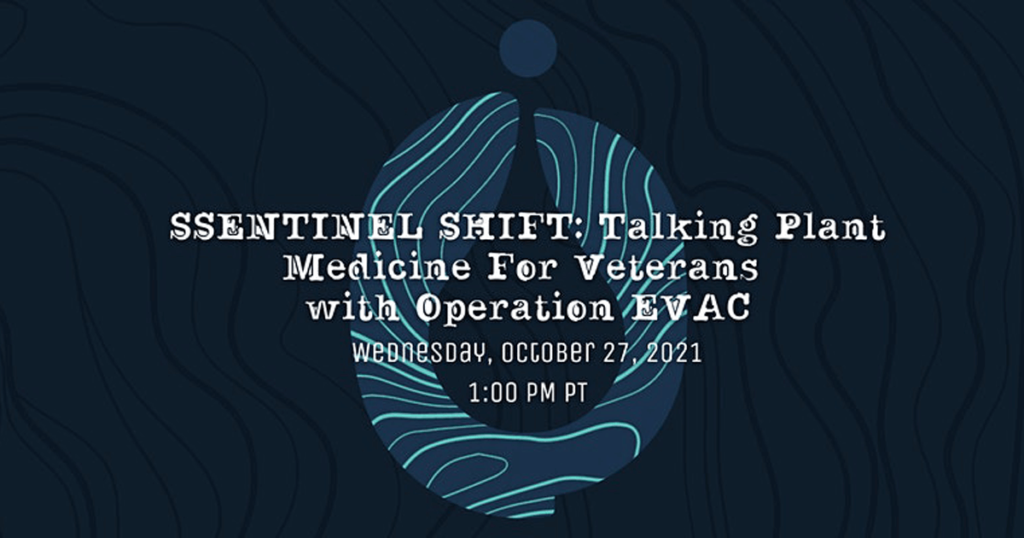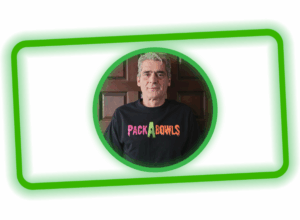I recently watched a discussion on veterans and plant medicine
Ryan Miller and Alex De La Campa of Operation EVAC (Educating Veterans About Cannabis) joined Brian Chaplin, CEO, and Founder at Medicine Box, to share experiences and stories regarding plant medicine and veterans.
I would not be doing them justice if I didn’t admit I teared up at several points listening to each of their experiences. I think you will if you listen to their talk, too! And, if you’re stressed or just want to feel refreshed, you can listen to the breathwork at the end of their talk from Alex De La Campa.
What Discussion?
Brian Chaplin recently hosted Alex De La Campa and Ryan Miller on his webinar:
“SENTINEL SHIFT: Talking Plant Medicine For Veterans with Operation EVAC”
Alex De La Campa
Advocate, consultant, and educator. He serves the veteran and Native American communities in numerous ways ranging from housing to access to plant medicine and education. Alex Founded A Future For Veterans. In addition, Alex is an Entheogenic devotee and facilitator for Operation EVAC.
Ryan Miller
United States Marine Corps veteran and founder of Operation EVAC. He previously worked at Harborside Health Center and ran the clone program before moving to help veterans full-time.
Brian Chaplin
Lover of nature since a young age. After experiencing life-threatening drug addiction later in life, Brian rediscovered craft cannabis and plant medicine, restoring his quality of life. These experiences led him to create Medicine Box. Brian is also heavily involved in advocating for plant medicine for all. Additionally, he indirectly understands veterans’ issues as his father served during Vietnam.
Their Discussion was Powerful and Emotional
Veterans Alex and Ryan shared their journeys with plant medicine, community involvement, and reintegration after leaving service.
Ryan said he used to have negative coping strategies and would self-harm. However, through plant medicine and being involved in the community, he has improved drastically.
Alex said that Ryan basically saved his life when they met at Harborside. They then reconnected at the Standing Rock protests years later. Because of this, they feel they’re on the right path together.
One of the most moving parts for me, fellow “non-combat” veteran, was listening to Ryan talk about how he used to feel less than due to not experiencing the treacheries of war.
Ryan said there is a hierarchy in the military: From those killed in action (KIA) to those wounded, to special operations, to the non-infantry or non-combat vets. This feeling of being “less-than” bothered him. This is something I know many veterans struggle with, including me.
Though, through using 5-MEO-DMT from the secretions of a Sonoran Desert toad, Ryan felt that he was enough.
Ryan says he felt he was visited by snipers and special forces in ghillie suits who told him he was worthy.
Remarkably, through his experience, Ryan realized he was not only enough but also that he didn’t need the violence, killing, or any additional trauma.
Many veterans experience life-changing breakthroughs and relief through the use of cannabis and other psychedelic substances. Yet, access is severely limited, even in many states with cannabis programs or decriminalized psychedelics. Often, the cannabis prices are too high, qualifying conditions are limited, it can be tough to find doctors, or there are only limited products available offered by a select number of companies.
This is why there is a strong push to increase access to cannabis, and psychedelics in general, for veterans.
Contrary to the reefer madness-style “education” many of us have experienced regarding psychedelics, the dangers are often highly-overstated. Many find these substances to be “exit drugs” from actually harmful substances, negative lifestyles, and poor coping strategies.
And, while we would never condone illegal activity, it is not wrong… or impossible, to grow your own mushrooms, or cannabis.
RELATED:
Veterans and Cannabis, The Battle Continues
Alanna Uhrich, Director of Brand Partnerships at Medicine Box, told me Medicine Box started an exciting new program to give back:
“We’ve just started a monthly charity program at Medicine Box, entitled Healing of the Nations, where 5% of all sales will go to a different charity we’re showcasing on our Shift webcast.
For November, it’s Operation E.V.A.C. (Educating Veterans About Cannabis), which serves the US veteran community through mental health interventions and plant medicine.”
Check out Medicine Box if you are looking for access to quality plant medicine and want to give back to a good cause while doing so.
Thank you, Brian, for increasing awareness about veterans’ issues and giving back to groups like Operation EVAC.
Veterans, and all people, not only deserve access, we need the right to access plant medicine restored.
Quotes from:
SENTINEL SHIFT: Talking Plant Medicine For Veterans with Operation EVAC (10/27/21)
Abbreviations: Brian Chaplin (BC), Alex De La Campa (AD), and Ryan Miller (RM)
*This discussion has been edited for length and clarity
AD: ” I would say that’s exactly why our organizations a future for veterans and Operation EVAC are necessary to the veteran communities. …We are committed to following that path. Everything from the way we organize our programming to the donations that we accept, to the procedures that we adopt to you know, work with our community, it all comes back to providing access to the plant access, you know, or even considering what could be considered medicine or recreational or you know, on the other end of the spectrum poison.
So, bringing attention back to these things, being aware of culture and how it works in our country. ..How our community is seen as a canary in a coal mine for the overall US culture at large.
So what we focus on is food, shelter, water. “
RM: “Operation EVAC exists to support veterans and help welcome them home.
You know, America does a great job sending young poor people to go fight wars overseas, but not such a great job at welcoming them home, reintegrating them into the community, and sort of distributing that, that burden of warfare among the village.
And so that’s what operation EVAC does, is hold space.
We sit in circle, and we share our stories, credit, packed practice on forming positive narratives. We set goals for the week, we have safe space, checking for vulnerability, sharing our stories, expressing ourselves, helps relieve that burden, that of trauma. And in being able to listen to these vulnerabilities, really enables us to understand that we’re not alone.
And so if an elder or someone else kind of had a problem that I had, and they were able to overcome it, then maybe I can, too.
Cannabis is a huge part of our platform.
We’ve distributed, collected and distributed hundreds of pounds of cannabis for free to our community members.
And we’ve recently started redistributing psilocybin. With that, I will say that, you know, plant medicine is doing a great job getting veterans off of the opiates of alcohol off of the hard street drugs. And it’s, you know, really fantastic transformative results.
It’s also really good bait, to get folks to come in, create a community avoid the isolation and hibernation that we often do. When we’ve experienced trauma, and create relationships, and form a community.
And in that community, we began sharing our stories, we also meditate together, we use a practice called Irest.
Yoga Nidra is developed at Walter Reed.
Our practitioner, Jane Leonard has been providing this service for years.
She’s fantastic. And so that’s essentially enabling us to strengthen our inner resources. Because life is triggering, right things happen, there’s ups and downs, and with you know, the equanimity that we can find from within, with the assistance from these plant medicines. We were fully capable of healing, adapting, growing and overcoming.”
AD: “..There’s a huge misunderstanding about veterans who receive disability payments.
On one hand, there’s many people don’t even realize that veterans receive disability payments, or even have access to benefits like housing or school, those kinds of things.
And then on the other, the people who do know, would expect that it provides some extravagant benefit, you know, and that same dynamic also exists in Native American communities.
A lot of people don’t even know that Native American communities are, you know, received dividends are paid, they, you know, they have this view that like, oh, they get gambling, dividends, you know, like, oh, some of these tribes must be rolling in it, at the same time, knowing full well, that Native Americans are one of the most impoverished populations, you know, in America.
Right. And the, the scope of difference between reservations and tribes is like, amazing, right?
So what ends up tends to happen is a lot of time veterans and Native American populations who get dividends or disability payments can isolate themselves, exacerbate their underlying issues and then end up on more negative.
A series of supportive services right or in some type of system or in some type of trouble or at the hospital or you know, in something.
So I think one thing that is misunderstood about the veteran community is really how we build community. Like, how do we do it?
And how do we do it successfully, so that people are getting what they need, because whether you’re getting disability payments, right, and still living on the street, or getting disability payments, and, you know, living in a nice 3000 square foot house, you know, it you’re still dealing with the trauma, right?
We’re all still dealing with the trauma. I think there was a study that just came out that the suicide rate actually jumped like 20%, and it’s something for veterans. So, what are we doing about this? You know, it’s, it’s, it’s well known that the suicide thing is up, but there’s that. I think that’s one of the issues that are underlying that isn’t well known.”
BC: “Heres your check every month, go away. My dad is on disability, he served in Vietnam. In 1970 he joined the Navy. He was on full disability but still needed Zoloft. A lot of underlying traumas plus the service. He lost a lot of family. Learning more, and, now he’s micro dosing with psilocybin. I have him on a micro dosing program, and he’s off the Zoloft. So nice work, dad!”
“Money isn’t the medicine.” – Alex De La Campa
AD: “On a personal note, I would just add that like, you know, money isn’t the medicine, right? And for military, it’s even less of a motivator, usually. So for them to try to fix it with that this, this is the wrong Band-Aid.”
RM: “ I think I’m glad that a lot of veterans are getting disability.
Economics is a big part of our challenges where we’re recruited out of poverty and then discharged right back into poverty. And that weighs on a person, especially a person that risked their lives, right for this land. But there’s one kind of shadow side of disability that we don’t really talk about.
And it’s that the financial security that disability payments bring is attached, maintaining symptoms. So if you get this, you know, MDMA therapy, or if you get some, you know, EMDR, or you connect to a community, like, Veterans Walk and Talk or Operation EVAC, and you achieve healing, right, you achieve recovery- that is going to put your financial security at risk, that disability percentage can and often will get lowered.
And that’s a really traumatizing experience to have that financial security kind of pulled out from under you. So it’s a dichotomy. It’s a dilemma.
Do I achieve healing? Or do I maintain symptoms to maintain this financial security?”
BC: “Interesting, so the more you heal, the less you get financially.
But money isn’t the medicine, the medicine is in the healing.
So that can probably put people that are in economic insecurity in a sticky position where they want to heal, but then, wow, so just another whole layer of challenge.”
AD: ” This is why A Future for Veterans does what it does, I think if we have our three core principles, it’s autonomy, authenticity, and purpose.
We’re trying to help develop a sense of autonomy, that you feel autonomous, in your own actions, authentic within those actions, that you feel you are guiding those actions, and then that those actions have a sense of purpose to drive them.
So whether you want to heal, right, you feel authentic and autonomous, to go and do that, and not dependent on any sort of benefit.
Right, that makes you feel good about that. To feel good about healing, because, in the truest sense, that’s teaching the manifest concept, right?
The money will come, trust that the money will come, right, because that’s the system that we live in. And if you’re going about it in a good way, as opposed to a scarcity mindset of maintaining what little you have, you know, or what little they’re giving you for everything that you’ve given them.”
Listen to the full talk at:
SENTINEL SHIFT: Talking Plant Medicine For Veterans with Operation EVAC (10/27/21) – YouTube
Buddy checks can save a life, and so can plant medicine.
Check on a veteran or caregiver today!
Resources:
A Future For Veterans:
https://www.afutureforvets.org/
Battle Brothers Foundation:
https://battlebrothersfoundation.org/
Operation EVAC:
http://www.opevac.org/
Veterans Walk and Talk:
https://veteranswalkandtalk.com/
Veterans Crisis Line:
Call 1-800-273-8255 and Press 1
https://www.veteranscrisisline.net/get-help-now/call/
White House VA Hotline: 1-855-948-2311.
https://www.va.gov/ve/myva411.asp
















